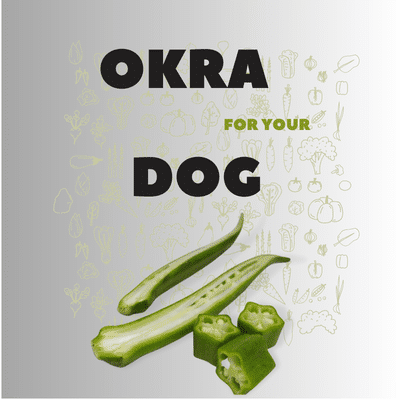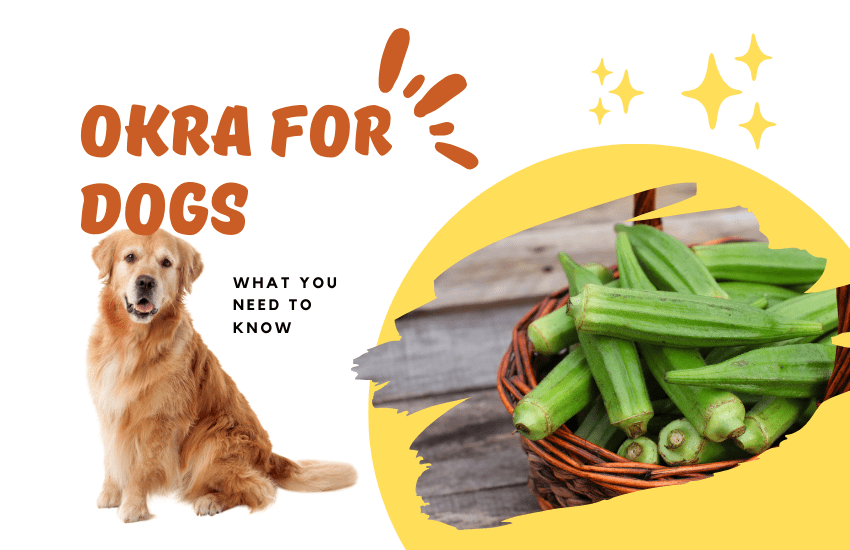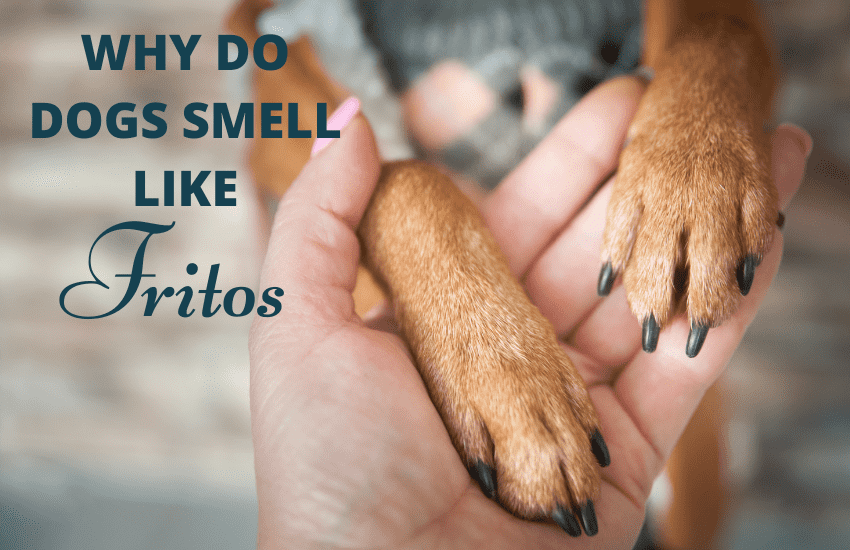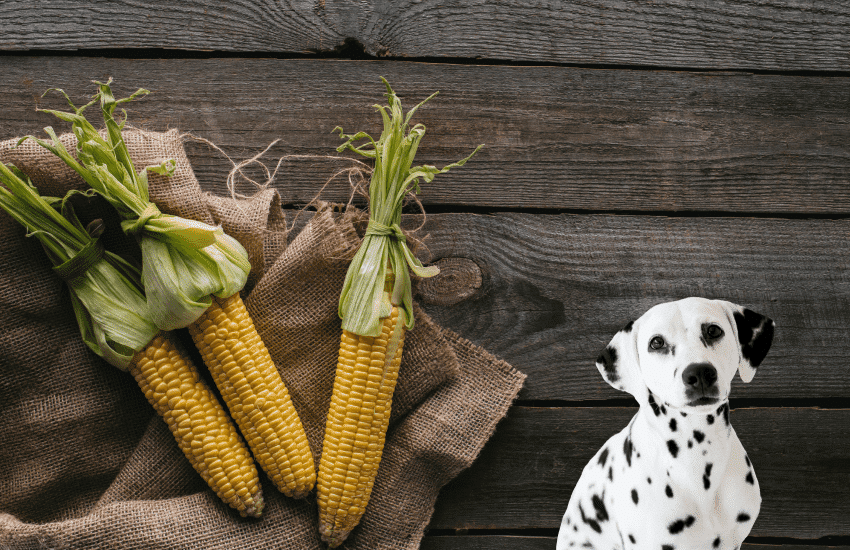Can dogs eat Okra?– Yes, dogs can eat okra in moderation. It’s a healthy, low-calorie treat when given properly.
Okra, a nutritious vegetable often found in gumbo and soups, can also be a beneficial addition to your dog’s diet. Rich in vitamins A and C, as well as fiber and antioxidants, okra supports the overall health of your canine companion.
When feeding your dog okra, always ensure it’s plain and cooked without spices or seasoning, which can be harmful to dogs. It’s essential to introduce any new food into your dog’s diet gradually to monitor for any adverse reactions, such as gastrointestinal upset. Remember to consider okra only as a treat, not as a replacement for a balanced dog diet. Moderation is key, as excessive amounts could lead to health issues, including obesity and nutrient imbalances.
Nutritional Value Of Okra
Pet owners often wonder about the safety of feeding their dogs various vegetables. Okra, a green flowering plant, is one such vegetable that comes to mind. Packed with nutrients, okra can offer dogs a healthy snack. Let’s delve into the nutritional value of okra and understand how it benefits our furry friends.
Vitamins And Minerals
Okra is a powerhouse of vitamins and minerals essential for a dog’s health. It includes:
- Vitamin A – for healthy skin, coat, and eyes
- Vitamin C – an antioxidant that supports the immune system
- Vitamin K – aids in blood clotting
- Vitamin B6 – important for brain development and function
These vitamins help maintain a dog’s bodily functions and prevent diseases. Okra also contains vital minerals such as:
| Mineral | Benefit |
|---|---|
| Calcium | For strong bones and teeth |
| Magnesium | Supports muscle and nerve function |
| Potassium | Good for heart health |
| Iron | Helps in oxygen transport |
| Zinc | Boosts the immune system |
Together, these nutrients support a dog’s overall well-being.
Dietary Fiber Content
Okra is rich in dietary fiber, which is beneficial for a dog’s digestive health. Fiber helps in:
- Regulating bowel movements – It prevents constipation and diarrhea.
- Weight management – It keeps dogs feeling full longer, preventing overeating.
- Controlling blood sugar – It slows down sugar absorption, helpful for diabetic dogs.
Fiber content in okra also promotes a healthy gut by fostering beneficial bacteria. This can lead to:
- Improved digestion
- Enhanced nutrient absorption
- A stronger immune system
Dogs that eat okra may experience these health perks. However, it’s important to feed okra in moderation to avoid digestive upset. Always remove the seeds and cook okra without spices or oils for your dog. In summary, okra’s fiber content can be a valuable addition to a dog’s diet.
Health Benefits For Dogs
Can dogs eat Okra? Yes, dogs can enjoy this green, nutritious vegetable just like humans! Okra is a great addition to your furry friend’s diet. It offers a range of health benefits that contribute to their overall well-being. From aiding digestion to boosting their immune system, okra can be a tasty and healthy treat for your pooch.
Improves Digestion
Okra is packed with dietary fiber, which is crucial for a dog’s digestive health. Fiber aids in the smooth movement of food through the digestive tract, ensuring your dog’s system runs like clockwork. Here’s how okra can help your dog’s digestion:
- Regulates bowel movements: The fiber in okra helps to firm up stools and reduce the chance of constipation.
- Supports gut health: Okra contains prebiotic fiber, which feeds the good bacteria in the gut, promoting a healthy digestive system.
- Reduces bloating: Okra’s high fiber content can help to alleviate gas and bloating in dogs.
Below is a table that highlights the fiber content in okra compared to other common dog-friendly veggies:
| Vegetable | Fiber Content (per 100g) |
|---|---|
| Okra | 3.2g |
| Carrots | 2.8g |
| Green Beans | 2.7g |

Supports Immune System
Okra is a powerhouse of nutrients that support a dog’s immune system. It’s rich in vitamins A and C, both known for their role in fighting off infections. Let’s explore the immune-boosting benefits of okra for dogs:
- Vitamin A: Essential for maintaining healthy skin, coat, and mucous membranes, which are the body’s first line of defense against pathogens.
- Vitamin C: An antioxidant that helps protect cells from damage by free radicals.
- Antioxidants: Okra has other antioxidants too, which help to reduce oxidative stress in your dog’s body.
In addition to vitamins, okra offers minerals like magnesium and folate which also play a role in maintaining a robust immune system. Here’s a simple breakdown:
| Nutrient | Immune Support Function |
|---|---|
| Vitamin A | Protects epithelial tissues |
| Vitamin C | Cellular protection |
| Magnesium | Enzyme activation |
| Folate | Cell division support |
Risks Of Feeding Okra To Dogs
Okra is a healthy vegetable packed with vitamins. It can be a tasty treat for dogs. Yet, not all parts of okra are safe for our furry friends. Some risks come with feeding okra to dogs. It’s important to know what they are to keep dogs happy and healthy.
Potential Choking Hazard
When giving dogs okra, one must be careful. The vegetable can cause them to choke. This is especially true if the okra is not cut properly. Small dogs and puppies are at a higher risk. They might struggle with larger pieces. To prevent choking, always cut the okra into small, bite-sized pieces. Here are some tips to avoid choking:
- Cut okra into small pieces that are easy for your dog to chew and swallow.
- Remove the seeds and the stem, which can be tough to eat.
- Watch your dog while they eat to make sure they are chewing properly.
| Dog Size | Okra Size |
|---|---|
| Small | 1/4 inch pieces |
| Medium | 1/2 inch pieces |
| Large | 3/4 inch pieces |
Digestive Issues
Okra has fiber which is good for digestion. But too much can be a problem. Dogs with sensitive stomachs may get digestive issues such as gas or diarrhea. To avoid this, introduce okra into your dog’s diet slowly. Start with a small piece to see how they handle it. Here are some signs of digestive problems:
- Loose stool or diarrhea
- Gurgling noises from the belly
- Lack of energy or discomfort
If your dog shows these signs, stop giving them okra and talk to a vet. Remember to always cook okra without spices or oils as these can upset a dog’s stomach. Plain, steamed, or boiled okra is best. Here’s a quick guide on how to introduce okra to your dog:
- Start with a tiny piece of cooked okra.
- Wait to see if there are any negative reactions.
- Slowly increase the amount over time if there are no issues.
Can dogs eat Okra? Best Ways To Serve Okra To Dogs
Curious about feeding your furry friend okra? You’re in luck! This green veggie is safe for dogs and can be a healthy addition to their diet. But, it’s essential to serve it the right way. Below, find the best methods to prepare okra for your canine companion.
Cooked Vs. Raw Okra
When introducing okra to your dog’s diet, choosing between cooked or raw is vital. Here’s what you need to know:
- Cooked okra is easier for dogs to digest. It’s softer and may reduce the risk of choking.
- Raw okra has more fiber but can be tough for dogs to chew. It’s best chopped into small, bite-sized pieces.
Texture and flavor play a role too. Cooked okra becomes soft and slimy, which some dogs love. Raw okra is crunchier and might be more appealing to others.
| Okra Type | Pros | Cons |
|---|---|---|
| Cooked Okra | Soft, easy to digest | Can be slimy |
| Raw Okra | Crunchy, more fiber | Harder to chew, risk of choking |
Always consider your dog’s size and dietary needs. Start with a small amount to ensure they handle it well. Remember, treats like okra should make up no more than 10% of a dog’s daily calorie intake.
Preparation Tips
Preparing okra for dogs can be simple. Follow these easy steps to make it a safe snack:
- Wash the okra thoroughly to remove pesticides.
- Cut off the ends and slice into small pieces.
- Steam or boil the okra if you choose to cook it. Avoid oils and spices.
Always avoid fried or breaded okra, as it contains unhealthy fats and additives. Here’s a quick guide:
| Preparation Method | Do’s | Don’ts |
|---|---|---|
| Steaming | Preserves nutrients | Don’t overcook |
| Boiling | Softens okra | No salt or seasonings |
| Raw | Chop into small pieces | Avoid the whole pod |
Introduce okra gradually and watch for any allergic reactions or digestive issues. If your dog enjoys okra and tolerates it well, it can be a nutritious snack in moderation. Always consult your vet before making significant changes to your dog’s diet.
Other Fruits And Vegetables For Dogs
Many dog owners wonder about the best snacks for their furry friends. Dogs can eat okra and other fruits and vegetables too. These foods can be healthy treats. But it’s important to know which ones are safe and which ones are not. Let’s explore.
Safe Options
Many fruits and vegetables make great snacks for dogs. They are not only safe but also packed with nutrients. Here are some good choices:
- Apples (without seeds)
- Carrots
- Green Beans
- Blueberries
- Pumpkin (not the pie filling)
These snacks are low in calories and high in vitamins. They can help keep your dog healthy. Always give them in moderation. Too much can cause an upset stomach.
| Fruit/Vegetable | Benefits |
|---|---|
| Apples | Good for teeth, source of vitamins A and C |
| Carrots | Low calorie, high in fiber and beta-carotene |
| Green Beans | Full of iron and vitamins |
| Blueberries | Rich in antioxidants |
| Pumpkin | Great for digestion |
Unsafe Options
Some fruits and vegetables are not safe for dogs. They can be toxic. Here is a list of foods to avoid:
- Grapes and raisins – can cause kidney failure
- Onions and garlic – can lead to anemia
- Avocado – contains persin, which is toxic
- Cherries – pits and leaves are toxic
- Tomatoes – stems and leaves are harmful
These foods can make your dog very sick. It’s best to keep them away from your pet. If your dog eats any of these, contact your vet right away.
| Unsafe Food | Reason |
|---|---|
| Grapes/Raisins | Can cause kidney failure |
| Onions/Garlic | Can lead to anemia |
| Avocado | Contains persin, toxic to dogs |
| Cherries | Pits and leaves are toxic |
| Tomatoes | Stems and leaves are harmful |
Consulting A Veterinarian
Is okra a safe snack for your furry friend? This question might pop up in the minds of dog owners who wish to share their veggies. Consulting a veterinarian is the best step before introducing any new food to your dog’s diet. Vets provide tailored advice that ensures your pet’s health and safety.
Importance Of Professional Advice
When considering okra for your dog, the importance of professional advice cannot be overstated. Here’s why:
- Veterinarians understand your dog’s unique dietary needs and can guide you on the right portion sizes.
- They can spot potential risks related to your dog’s health, like obesity or underlying conditions.
- Professionals have the knowledge to balance your dog’s overall diet with new additions like okra.
Consider the following table to understand what a vet checks before approving a new food item:
| Check | Description | Impact on Diet |
|---|---|---|
| Current Health | Your dog’s overall health status | Ensures okra is beneficial |
| Allergy Test | Tests for possible allergic reactions | Prevents adverse effects |
| Nutritional Needs | Evaluates your dog’s dietary requirements | Guarantees a balanced diet |
By seeking a vet’s advice, you ensure your dog enjoys okra safely and stays in tip-top shape.
Allergies And Individual Considerations
Each dog is unique, and so are their reactions to different foods. The topic of allergies and individual considerations is crucial when feeding your dog okra:
- Identify possible allergies that can lead to itching, swelling, or more severe reactions.
- Understand that some dogs have sensitive stomachs; what works for one may not work for another.
- Realize that the dog’s breed, age, and activity level affect dietary tolerances.
Here’s a simple list to help monitor your dog after feeding them okra for the first time:
- Watch for any immediate allergic reactions, such as hives or difficulty breathing.
- Observe their digestive response, like changes in bowel movements or signs of discomfort.
- Note their energy levels and any unusual behavior that might suggest discomfort or pain.
Keeping an eye on your dog’s response ensures they can safely enjoy okra. Remember, your vet’s guidance, coupled with careful observation, is the key to a happy, healthy pet.
Healthy Okra Recipes For Your Dog
Many dog owners wonder about the range of vegetables their furry friends can safely consume. Okra, a nutritious green pod, often raises questions. Rest assured, dogs can eat okra! It’s a great source of vitamins and fiber, beneficial for your pet’s digestion. Now, let’s dive into some delicious and healthy okra recipes tailored for your dog.
Simple Steamed Okra For Dogs
Steaming okra is an excellent way to preserve its nutrients without any added fats or spices that could harm your dog. To prepare this simple dish:
- Clean the okra pods thoroughly under running water.
- Trim the ends and slice into bite-sized pieces.
- Place in a steamer and cook until tender.
- Let it cool before serving to avoid burns.
Offer these steamed okra pieces as a treat or mix them into your dog’s regular food for a vitamin boost.
Okra & Chicken Mix
Combine okra with chicken for a protein-rich meal your dog will love. Here’s how to make it:
- Boil chicken breast and let it cool.
- Chop the chicken into small, manageable pieces for your dog.
- Slice steamed okra (as above) and mix with the chicken.
This meal is not only tasty but also full of nutrients.
Okra Treat Bites
For a crunchy snack, okra treat bites are perfect. They are easy to make:
- Preheat your oven to a low temperature.
- Slice okra into thin pieces.
- Place on a baking sheet and bake until crispy.
These treats are ideal for training or as a healthy snack.
Frequently Asked Questions
Is Okra Safe For Dogs To Eat?
Yes, dogs can safely eat okra in moderation. Ensure it’s plain and cooked without spices or seasonings. Raw okra is also fine, but it’s harder to digest. Always introduce new foods gradually to your dog’s diet.
How To Prepare Okra For Dogs?
Wash okra thoroughly and trim off ends. Cook lightly, steaming or boiling briefly. Chop into small, bite-sized pieces. Remove seeds if your dog has difficulty digesting them. Serve cool as a treat or mix with regular dog food.
What Vegetable Is Not Good For Dogs?
Onions and garlic are vegetables that are harmful to dogs. They can cause gastrointestinal irritation and red blood cell damage.
Can Dogs Eat Eggplant And Okra?
Dogs can eat eggplant and okra in moderation, provided they’re cooked and served plain. Always introduce new foods gradually to avoid digestive upset.
Conclusion
Concluding our discussion on okra for dogs, it’s clear that this veggie can be a healthy snack. Always remember to serve it cooked and in moderation. Consult your vet with any dietary changes to ensure your pup’s health and safety.
Okra, when prepared properly, can be a nutritious addition to your dog’s diet.







